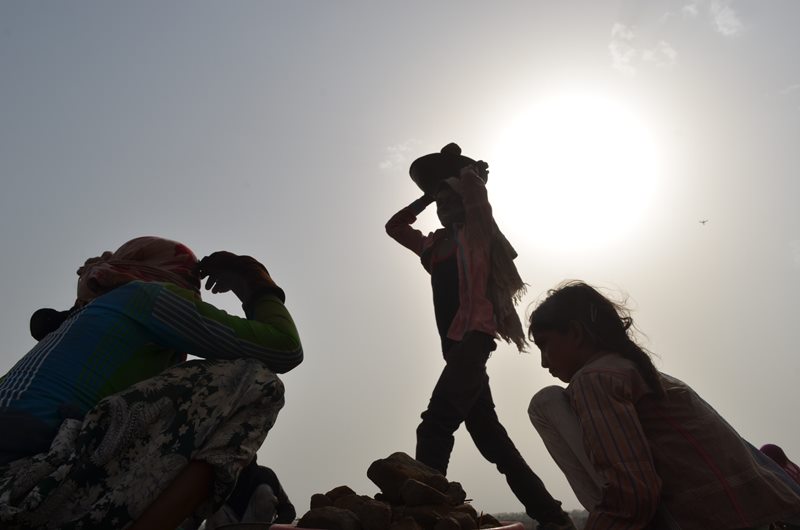Rising heat causing labour losses; 162 lost hours per person per year in India, finds a study
A new study shows India is amongst the most affected countries showing the largest heat exposure impacts on heavy labour, mostly agricultural and construction workers. Midday heat exposure causes productivity losses of upto 20 minutes an hour in the country. Is moving heavy labour to the early morning hours an alternative?


India, where larger fractions of the population work outdoors, is amongst the countries to be impacted the most. Photo: By arrangement
Rising heat due to global warming is causing labour losses and India is one of the worst affected countries. As both heat and humidity levels rise due to climate change, leading to heat stress, it is estimated that labourers working outdoors will experience the biggest overall losses — economic, health and wellbeing.
These are some of the key findings of a new study titled ‘Increased labor losses and decreased adaptation potential in a warmer world’ led by the researchers at North Carolina-based Duke University. The study found that workers in Asia, the Middle East, Africa and the western Pacific will bear the worst impacts of the rising heat. India, where larger fractions of the population work outdoors, is amongst the countries to be impacted the most.
“Humid heat is particularly dangerous because high ambient temperatures combined with high humidity impede the body’s ability to lose body heat to the outside environment by evaporative cooling from sweating,” explained the researchers in the study released yesterday on December 14.
Countries with large populations in South and East Asia experience the most work hours lost, both in the coolest hours and in the full workday. India has shown the largest heat exposure impacts on heavy labour (more than 101 billion hours lost/year), despite its modest average per-capita labour losses — 162 lost hours per person per year.

Also Read: Labour survey shows a decline in women’s share in workforce in the last 8 years
‘Most impacted not responsible for carbon emissions’
The study pointed out that critical jobs, such as agricultural work and construction work, will become almost impossible to perform safely during afternoon hours in the summer in many places.
“Sadly, many of the countries and people most impacted by current and future labour losses are not responsible for the bulk of greenhouse gas (carbon) emissions,” Luke Parsons, a climate researcher at Duke’s Nicholas School of the Environment, who led the study, was quoted in its press statement.
“Many workers in the tropics are already stopping work in the afternoon because it’s too hot,” he said. “Luckily, about 30 per cent of this lost labour can still be recovered by moving it to the early morning. But with each additional degree of global warming, workers’ ability to adapt this way will swiftly decrease as even the coolest hours of the day quickly become too hot for continuous outdoor labour,” Parsons added.
Upto 20 mins/hour lost due to heat exposure
In many low-latitude locations, heat exposure in the shade is already at or approaching levels that lead to substantial heavy labour productivity losses both in the morning and at midday.
For instance, an average summer day in New Delhi exposes workers in the shade to midday heat exposure that would cause productivity losses of approximately 15-20 minutes per hour of safe work time.

Contrarily, the early morning hours tend to still be cool enough to approach ‘safe’ work thresholds for continuous heavy manual labour, with less than 10 minutes per hour productivity losses.
Impact on health, what is the way forward
The researchers pointed out that heat exposure is also implicated as a potential contributing factor to an epidemic of chronic kidney disease in otherwise healthy, relatively young workers in Central America, Sri Lanka, India, and Egypt.
The researchers recommended that in high humidity and temperatures, outdoor workers must slow work, hydrate, and take breaks in the shade to allow the body to cool off and maintain a safe internal body temperature or risk injury, illness, or death if they continue to work at high exertion level.
Also Read: Ishrat Jahan epitomises the pain of farmers repeatedly hit by extreme weather events
If average global temperatures rise by another two degree Celsius—or about 3.6 degree Fahrenheit— relative to the present, labour losses in the coolest half of the day will exceed current losses in the hottest half, said Parsons.
“Our analysis shows that if we limit warming to within another degree of current levels, we can still avoid most worker productivity losses by moving heavy labour to the early morning hours. But if warming exceeds one degree Celsius, that becomes much more difficult. It’s a sliding curve, it gets exponentially worse as the temperature rises,” he said.

